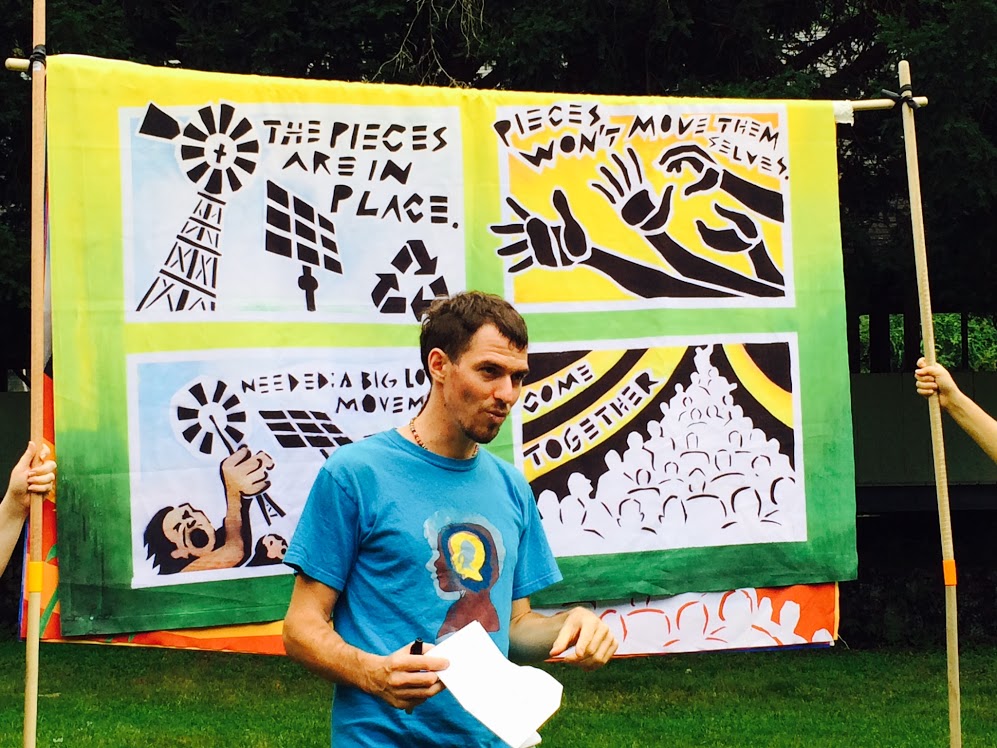Year’s first major talk to feature stellar cast of environmental justice figures
The CSU’s first talk of the year on Sept. 3 will feature environmental journalist Bill McKibben and indigenous activist Ellen Gabriel discussing climate change and human rights in the only Canadian stop of the People’s Climate Tour, advertised as the world’s biggest climate change protest.
Scheduled alongside a New York City climate change summit to be attended by heads of state and policy-makers, the tour will be mirrored internationally in over a dozen countries. Hundreds of groups will be participating in a massive display of environmental mobilization seeking to pressure governments and corporations into rethinking environmentally-detrimental policies and projects.
One such group to have a strong presence at Wednesday’s talks will be 350.org (of which McKibben is a founding member), a global organization looking to limit the worldwide concentration of atmospheric CO2 to 350 parts-per-million — a figure widely considered the threshold beyond which destructive climate change is unavoidable. (The current concentration is 400 parts-per-million.)
Alongside a campaign to increase institutional divestment of fossil fuels, 350.org has long rallied grassroots action against, among other things, tar sands development and the transnational pipeline. Alongside the CSU, they’ve planned the event alongside the Students’ Society of McGill University (SSMU) and the Divest chapters of both universities.
“If we have a mission at this point of time it’s to build a climate cross-movement not just on environmental issues, but working with labour, working with frontline indigenous communities [and] the communities dealing with the worst impacts of climate change,” said 350.org’s Tar Sands Organizer and onetime Concordia student Cam Fenton, who has handled publicity and media relations for the event.
Fenton says the choice of Montreal as a location was a natural one and that Canadian youth in general were particularly sensitive to environmental issues.
“Environmentalism cuts across all sorts of social issues, indigenous rights, worker’s rights, and is especially grounded in the sense that we’re talking about what will happen to our future,” he said.
Fenton believes the presence of the participants, McKibben and Gabriel included will serve as a powerful inspiration to all who attend.
McKibben, whose decades-long career and seminal 1989 work The End of Nature is seen by some as starting the public discourse on global warming, has long tried to raise public consciousness on the issue of man-made climate change and the increasingly important urgency to cease modern man’s destructive existence and move towards a sustainable, if humbler, lifestyle.
Gabriel, another Concordia graduate hailing from the Kanehsatà:ke Mohawk nation, first rose to international prominence as one of the spokespeople for the Mohawk protesters during the 1990 Oka crisis. She’s since campaigned for the revitalization of native traditions and rights and a greater inclusion of indigenous concerns in social and political discourse, and protested the expansion of tar sands pipelines.
“[Gabriel] has such a powerful voice when it comes to indigenous rights,” said Fenton, calling her a ‘frontline community voice in resistance.’
He said her knowledge would combine with McKibben’s reputation to make for a powerful strategy on account of the powerful position indigenous communities possess in terms of experience with environmental damage and the land rights enshrined to them by the Constitution.
“It’s not just something that can be solved by a single environmental organization,” he said.
Earlier this year the Supreme Court echoed this sentiment when it ruled in favour of a native rights claim by the B.C. Tsilhqot’in nation to 1,700 square kilometers of traditional land falling outside reservations. The ruling reiterated that any attempts by non-native entities to resource extraction over this land required explicit consent by its traditional inhabitants, effectively creating the possibility of veto powers by other indigenous nations over corporate and government-led development.
Fenton hopes the visit to Montreal will accurately transmits the urgent need for change to individuals curious to learn more and galvanize the determination of established environmentalists: “The decisions we make today [are what] the young people will have to live with; [they] see the urgency of action.”
The People’s Climate Tour will be held on Sept. 3 from 7 – 10 p.m at the H-110 Alumni Auditorium of the Hall Building, 1455 de Maisonneuve Blvd. W. Tickets are free but limited in number. Consult http://350.org/peoplesclimatetour/ for reservations and attitional information.
